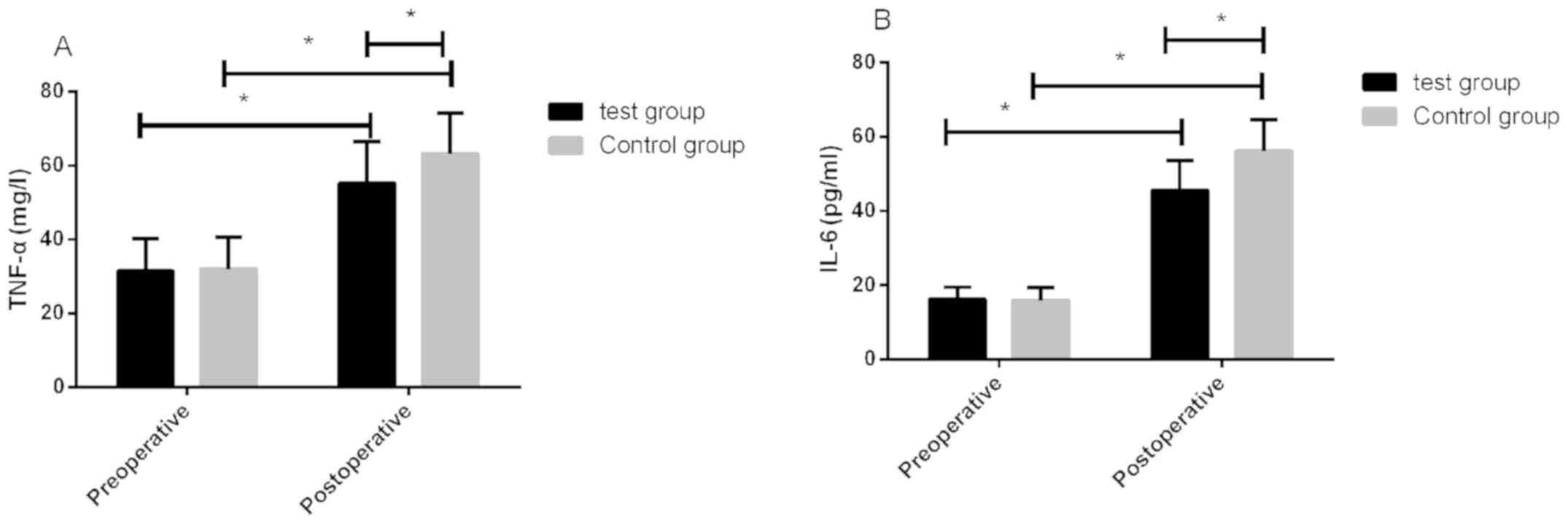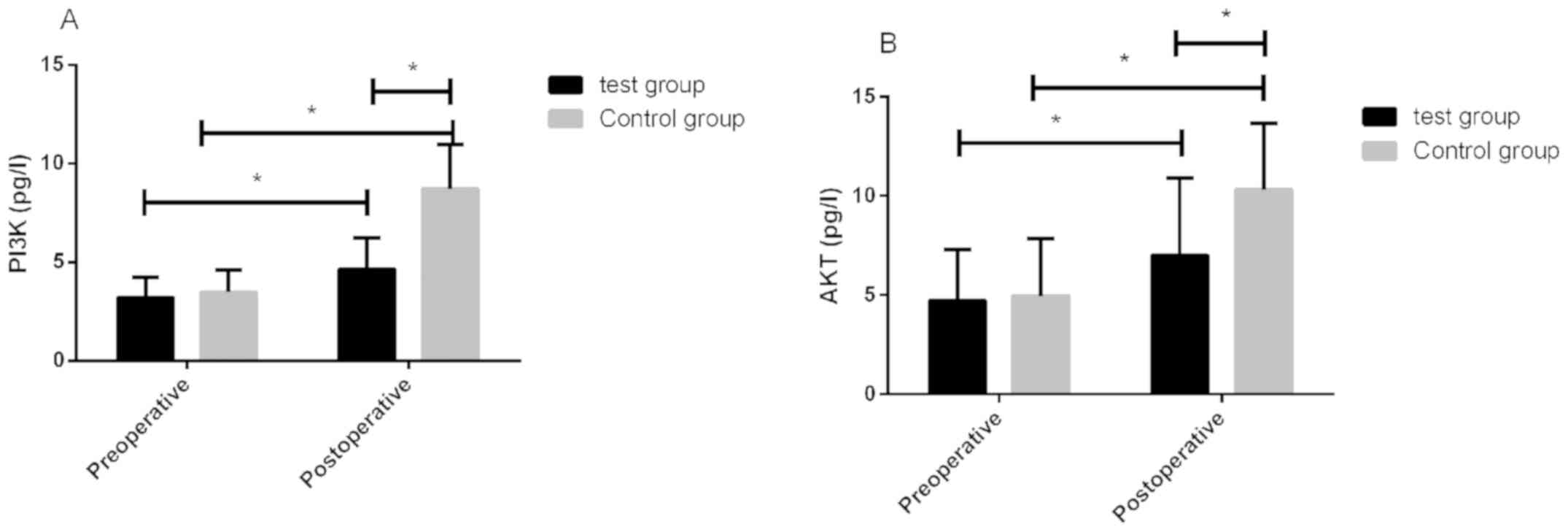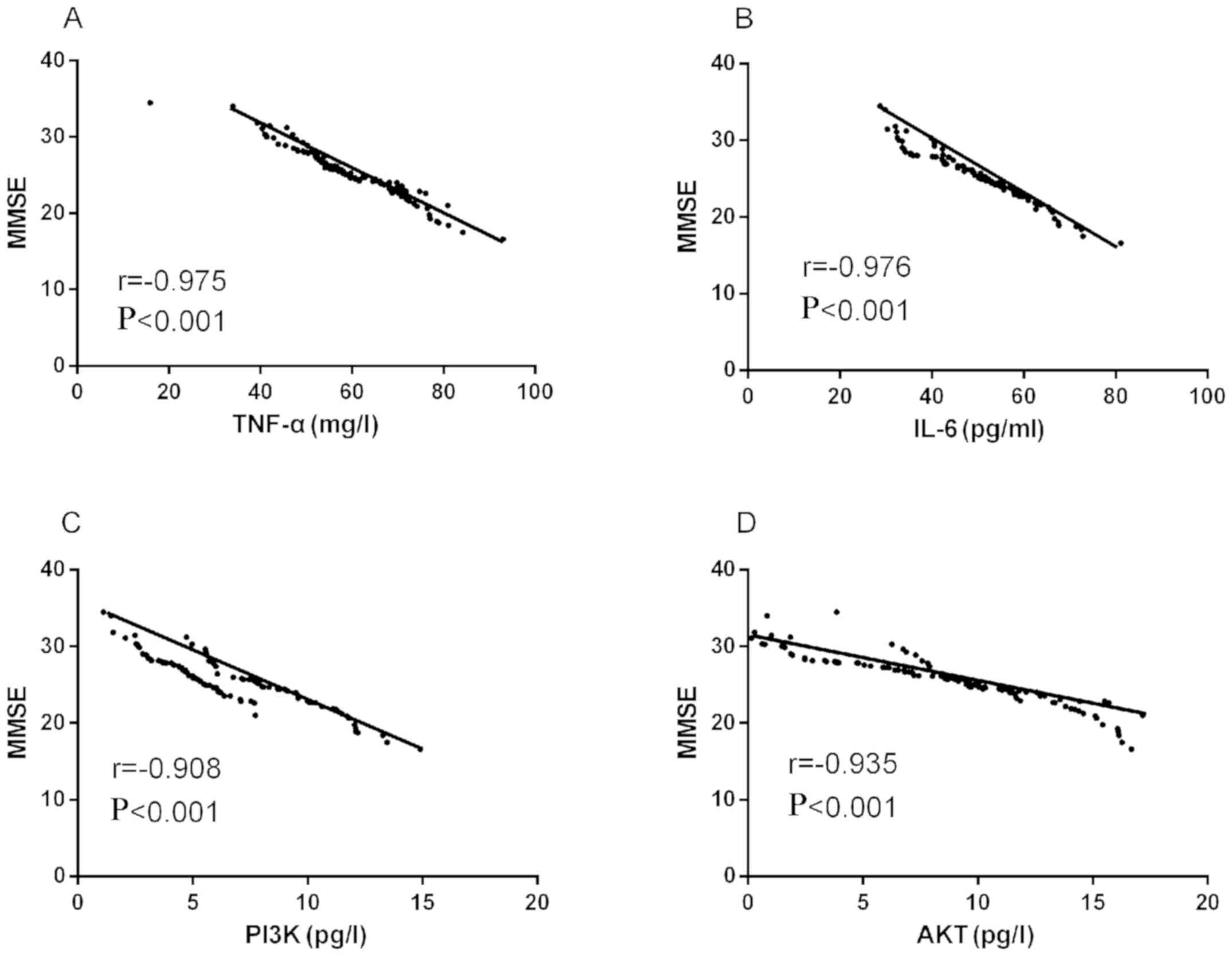|
1
|
Jemal A, Bray F, Center MM, Ferlay J, Ward
E and Forman D: Global cancer statistics. CA Cancer J Clin.
61:69–90. 2011. View Article : Google Scholar : PubMed/NCBI
|
|
2
|
Hudetz JA, Patterson KM, Iqbal Z, Gandhi
SD and Pagel PS: Remote ischemic preconditioning prevents
deterioration of short-term postoperative cognitive function after
cardiac surgery using cardiopulmonary bypass: Results of a pilot
investigation. J Cardiothorac Vasc Anesth. 29:382–388. 2015.
View Article : Google Scholar : PubMed/NCBI
|
|
3
|
Lien EC, Dibble CC and Toker A: PI3K
signaling in cancer: Beyond AKT. Curr Opin Cell Biol. 45:62–71.
2017. View Article : Google Scholar : PubMed/NCBI
|
|
4
|
Zhou S, Fang Z, Wang G and Wu S: Gap
junctional intercellular communication dysfunction mediates the
cognitive impairment induced by cerebral ischemia-reperfusion
injury: PI3K/Akt pathway involved. Am J Transl Res. 9:5442–5451.
2017.PubMed/NCBI
|
|
5
|
Riquelme I, Tapia O, Leal P, Sandoval A,
Varga MG, Letelier P, Buchegger K, Bizama C, Espinoza JA, Peek RM,
et al: miR-101-2, miR-125b-2 and miR-451a act as potential tumor
suppressors in gastric cancer through regulation of the
PI3K/AKT/mTOR pathway. Cell Oncol (Dordr). 39:23–33. 2016.
View Article : Google Scholar : PubMed/NCBI
|
|
6
|
Singh SS, Yap WN, Arfuso F, Kar S, Wang C,
Cai W, Dharmarajan AM, Sethi G and Kumar AP: Targeting the PI3K/Akt
signaling pathway in gastric carcinoma: A reality for personalized
medicine? World J Gastroenterol. 21:12261–12273. 2015. View Article : Google Scholar : PubMed/NCBI
|
|
7
|
Weerink MAS, Struys MMRF, Hannivoort LN,
Barends CRM, Absalom AR and Colin P: Clinical pharmacokinetics and
pharmacodynamics of dexmedetomidine. Clin Pharmacokinet.
56:893–913. 2017. View Article : Google Scholar : PubMed/NCBI
|
|
8
|
Hall JE, Uhrich TD, Barney JA, Arain SR
and Ebert TJ: Sedative, amnestic, and analgesic properties of
small-dose dexmedetomidine infusions. Anesth Analg. 90:699–705.
2000. View Article : Google Scholar : PubMed/NCBI
|
|
9
|
Lobo FA, Wagemakers M and Absalom AR:
Anaesthesia for awake craniotomy. Br J Anaesth. 116:740–744. 2016.
View Article : Google Scholar : PubMed/NCBI
|
|
10
|
Deiner S, Luo X, Lin HM, Sessler DI,
Saager L, Sieber FE, Lee HB, Sano M, Jankowski C, Bergese SD, et al
the Dexlirium Writing Group, : Intraoperative infusion of
dexmedetomidine for prevention of postoperative delirium and
cognitive dysfunction in elderly patients undergoing major elective
noncardiac surgery: A randomized clinical trial. JAMA Surg.
152:e1715052017. View Article : Google Scholar : PubMed/NCBI
|
|
11
|
Kunnimalaiyaan S, Sokolowski KM,
Balamurugan M, Gamblin TC and Kunnimalaiyaan M: Xanthohumol
inhibits Notch signaling and induces apoptosis in hepatocellular
carcinoma. PLoS One. 10:e01274642015. View Article : Google Scholar : PubMed/NCBI
|
|
12
|
Wu J, Vogel T, Gao X, Lin B, Kulwin C and
Chen J: Neuroprotective effect of dexmedetomidine in a murine model
of traumatic brain injury. Sci Rep. 8:49352018. View Article : Google Scholar : PubMed/NCBI
|
|
13
|
Sun YB, Sun SH, Liu DW, Bai B, Zhang YL,
Guo YX and Jiang K: The influence of different anesthesia
techniques on cognitive dysfunction in elderly patients. Int J Clin
Exp Med. 9:16373–16378. 2016.
|
|
14
|
Tan WX, Hai N and Mo MZ: The relationship
between the serum levels of NSE, S-100 beta protein and IL-6 and
postoperative cognitive dysfunction in aged patients with general
anesthesia. Guangdong Med. 34:3178–3179. 2013.
|
|
15
|
Li YC, Xi CH, An YF, Dong WH and Zhou M:
Perioperative inflammatory response and protein S-100β
concentrations - relationship with post-operative cognitive
dysfunction in elderly patients. Acta Anaesthesiol Scand.
56:595–600. 2012. View Article : Google Scholar : PubMed/NCBI
|
|
16
|
Hofer S, Steppan J, Wagner T, Funke B,
Lichtenstern C, Martin E, Graf BM, Bierhaus A and Weigand MA:
Central sympatholytics prolong survival in experimental sepsis.
Crit Care. 13:R112009. View
Article : Google Scholar : PubMed/NCBI
|
|
17
|
Moriya C, Jinnin M, Yamane K, Maruo K,
Muchemwa FC, Igata T, Makino T, Fukushima S and Ihn H: Expression
of matrix metalloproteinase-13 is controlled by IL-13 via PI3K/Akt3
and PKC-δ in normal human dermal fibroblasts. J Invest Dermatol.
131:655–661. 2011. View Article : Google Scholar : PubMed/NCBI
|
|
18
|
Wang Y, Wu C, Han B, Xu F, Mao M, Guo X
and Wang J: Dexmedetomidine attenuates repeated propofol
exposure-induced hippocampal apoptosis, PI3K/Akt/Gsk-3β signaling
disruption, and juvenile cognitive deficits in neonatal rats. Mol
Med Rep. 14:769–775. 2016. View Article : Google Scholar : PubMed/NCBI
|
|
19
|
Gu J, Sun P, Zhao H, Watts HR, Sanders RD,
Terrando N, Xia P, Maze M and Ma D: Dexmedetomidine provides
renoprotection against ischemia-reperfusion injury in mice. Crit
Care. 15:R1532011. View
Article : Google Scholar : PubMed/NCBI
|
|
20
|
Zhu YM, Wang CC, Chen L, Qian LB, Ma LL,
Yu J, Zhu MH, Wen CY, Yu LN and Yan M: Both PI3K/Akt and ERK1/2
pathways participate in the protection by dexmedetomidine against
transient focal cerebral ischemia/reperfusion injury in rats. Brain
Res. 1494:1–8. 2013. View Article : Google Scholar : PubMed/NCBI
|
|
21
|
Qian XL, Zhang W, Liu MZ, Zhou YB, Zhang
JM, Han L, Peng YM, Jiang JH and Wang QD: Dexmedetomidine improves
early postoperative cognitive dysfunction in aged mice. Eur J
Pharmacol. 746:206–212. 2015. View Article : Google Scholar : PubMed/NCBI
|
|
22
|
Chen N, Chen X, Xie J, Wu C and Qian J:
Dexmedetomidine protects aged rats from postoperative cognitive
dysfunction by alleviating hippocampal inflammation. Mol Med Rep.
20:2119–2126. 2019.PubMed/NCBI
|

















